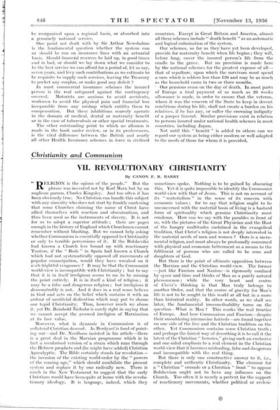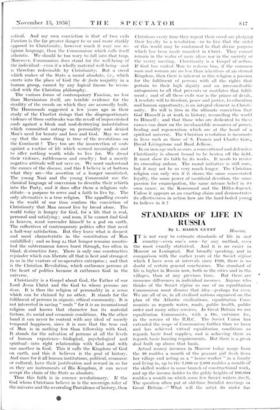VII. REVOLUTIONARY CHRISTIANITY
Christianity and Communism
By CANON F. R. BARRY
" RELIGION is the opium of the people." But the phrase was invented not by Karl Marx but by an anglican parson, Charles Kingsley. And too often it has been obviously true. No Christian can handle this subject with any sincerity who does not start by frankly confessing that some Churches claiming the name of Christ have allied themselves with reaction and obscurantism, and thus been used as the instruments of slavery. It is not for us to adopt a superior attitude ; there arc pages enough in the history of England which Churchmen cannot remember without blushing. But we cannot help asking whether Communism is essentially opposed to Christianity or only to terrible perversions of it. If the Bolsheviks had known a Church less bound up with reactionary Tsarism, if the " Reds " in Spain had known a Church -which had not systematically opposed all movements of popular emancipation, would they have wreaked on it such frightful vengeance ? It may be that the Communist world-view is incompatible with Christianity ; but to say that it is in itself irreligious seems to me to be missing the point entirely. It is in itself a kind of religion ; it may be a false and dangerous religion ; but irreligious it demonstrably is not. And it does in a real sense believe in God and acts on the belief which sustains it with an ardour of sacrificial dedication which may put to shame our tepid Christianity. Thus, however much we abuse it, yet Dr. Reinhold Niebuhr is surely right in saying that we cannot accept the avowed irreligion of Marxianism at its face value.
Moreover, what is dynamic in Communism is of collateral Christian descent. As Berdyaef is fond of point- ing out—and Dr. Needham insisted in his article—there is a great deal in the Marxian programme which is in fact a secularised version of a strain which runs through the Hebrew prophets and (he might have added) Christian Apocalyptic. The Bible certainly stands for revolution— the invasion of the existing world-order by the "powers of the coming age," which should annihilate the present system and replace it by one radically new. There is much in the New Testament to suggest that the early Christians would have been quite at home with the revolu- tionary ideology. It is language, indeed, which they sometimes spoke. Nothing is to be gained by obscuring this. Yet it is quite impossible to identify the Communist world-view with that of Jesus. This is not on account of its " materialism " in the sense of its concern with economic values ; for to say that religion ought to be unconcerned with the material basis of living is a bastard form of spirituality which genuine Christianity must condemn. How can we say with the parables in front of us, with the pictures of the Great Physician and the Host of the hungry multitudes enshrined in the evangelical tradition, that Christ's religion is not deeply interested in the material needs of men and women ? Ours is a sacra- mental religion, and must always be profoundly concerned with physical and economic betterment as a means to the fulfilment of persons who are called to be sons and daughters of God.
But there is the point of ultimate opposition between the Marxian and the Christian world-view. .The former —just like Fascism and Nazism—is rigorously confined by space and time and thinks of Man as a purely natural phenomenon ; while the very heart and centre of Christ's thinking is that Man truly belongs to another Order, and that the centre of gravity for Man's life is not to be sought in this world at all but in a more than historical reality. In other words, as we shall see later, the fundamental irreconcileability turns on the question—What is Man ? This marks the real frontier of Europe. And here Communism and Fascism—despite their smouldering internecine hatreds—are found together on one side of the line and the Christian tradition on the other. Yet Communism contains some Christian truth ; and perhaps the fairest way of describing it is to call it the latest of the Christian " heresies," giving such an exclusive and one-sided emphasis to a real element in the Christian world-view that it becomes misleading, false and dangerous and incompatible with the real thing.
But there is only one constructive answer to it, i.e., complete and authentic Christianity. The clamour for a " Christian " crusade or a Christian " front " to oppose Bolshevism ought not. to have any influence on the Church. Too often it is merely a pretext for the support of reactionary movements, whether political or ecclesi- astieal. And my own conviction is that of two evils Fascism is the far greater danger to us and more starkly opposed to Christianity, however much it may use re- ligious language, than the Communism which calls itself atheistic. We should be too wary to fall into that trap. Moreover, Communism does stand for the well-being of the individual—even if a wholly material well-being—and is therefore redeemable by Christianity. But a creed which makes of the State a moral absolute, i.e., which erects into the place of God the de facto majority in a human group, cannot by any logical finesse be recon-. ciled with the Christian philosophy.
The various forms of contemporary Fascism, no less than Marxianism itself, are terrible evidence for the sterility of the creeds on which they are avowedly built. The Hammonds suggested a few years ago in their study of the Chartist risings that the disproportionate violence of those outbreaks was the revolt of impoverished souls against a bleak and soul-destroying industrialism which committed outrage on personality and denied Man's need for beauty and love and God. May we not Fay that the same thing is true of the revolutions on the Continent ? They too are the insurrection of souls against a routine of life which seemed meaningless and to offer nothing worth while to live for. We dread their violence, ruthlessness and cruelty ; but a merely 'negative attitude will not save us. We must understand the causes of the disease, and this I believe is at bottom what they are—the assertion of a hunger unsatisfied. The young Nazi and the young Communist use the classical language of conversion to describe their rebirth into the Party, and it does offer them a religious sub- stitute—a purpose to serve and a faith to live by. The only alternative is a true religion. The appalling events in the world of our time confirm the conviction of Christianity that Man cannot live by bread alone. The world today is hungry for God, for a life that is real, personal and satisfying ; and man, if he cannot find God in heaven, must surrender himself to a god on earth. The collectives of contemporary politics offer that need a half-way satisfaction. But they leave what is deepest and most characteristic in the constitution of Man unfulfilled ; and so long al that hunger remains unsatis- fied the subterranean forces burst through, too often in blind, destructive fury. There is only one constructive rejoinder which can liberate all that is best and strongest in us in the venture of co-operative enterprise ; and that is the Christian Revolution, which enthrones persons at the heart of politics because it enthrones God in the universe.
Christianity is a Gospel about God, the Father of our Lord Jesus Christ and the God to whom persons are dear. It is thus the religion of personality in a sense which can be claimed by no other. It stands for the fulfilment of persons in organic, ethical community. It is not interested in saving " souls " for it is an incarnational religion and knows that character has its material factors, its social and economic conditions. On the other hand it can never be content with any ideal of merely temporal happiness, since it is sure that the true end of Man is in nothing less than fellowship with God. It stands for the salvation of persons at all the levels of human experience—biological, psychological and spiritual—into right relationship with God and with one another in God. This it calls the Kingdom of God on earth, and this it believes is the goal of history. And since for it all human institutions, political, economic or cultural, have their justification and reward in so far as they are instruments of His Kingdom, it can never accept the claim of the State as absolute.
Thus this faith is in essence revolutionary. If the God whom Christians believe in is the sovereign ruler of the universe and the overruling Providence of history, then
•
Christians every time they repeat their creed are pledging their loyalty to a revolution—so to live that the order of this world may be conformed to that divine purpose which has been made manifest in Christ. They cannot remain in the realm of mere ideas nor in the sacristy or the vestry meeting. Christianity is a Gospel of action. If God has visited Man to redeem him, if the common man and woman are no less than inheritors of an eternal Kingdom, then there is inherent in this religion a passion for the fulfilment of persons with all the rights that pertain to their high dignity and an irreconeileable antagonism to all that prevents or mutilates that fulfil- ment ; and of all these evils war is the prince of devils. A resolute will to freedom, peace and justice, to education and human opportunity, is an integral element in Christi- anity. Its will is firm in the ultimate conviction that. God Himself is at work in history, reconciling the world to Himself ; and that those who are dedicated to these causes can draw on the inexhaustible resources of power. healing and regeneration which arc at the heart of a spiritual universe. The Christian revolution is incarnate in lives such as those of S. Francis and Charles Gore, David Livingstone and Basil Jellicoe.
In an iron age such as ours, a conventional and defensive Christianity is almost bound to be beaten off the field. It must show its faith by its works. It needs to revive its crusading ardour. The moral initiative is still ours, but it may not be so very much longer. The Christian religion can only win if it shows the same consecrated loyalty, the same power of sacrificial devotion, the same passion for emancipation, the same intense belief in its own cause, as the Komsomol and the Hitler-Jugend. 'Unless it appears as an exacting claim and demonstrates its effectiveness in action how are the hard-boiled young to believe in it ?















































 Previous page
Previous page